The tradition of African churches in the American South goes back to before the American Revolution. In fact, it may come as a surprise that oldest home-grown African churches in America, perhaps the world, arose in a place and time where Africans were brutally oppressed and for the most part enslaved. Early African Baptist congregations came about in two waves: the first just before and during the American Revolution, when many Africans still lived under the nominal protection of the British Empire; and the second during and after the Reconstruction era. Many of these churches have arisen to great historic prominence and are now an integral part of the rich religious heritage of the American Bible Belt.
First African Baptist Church
Savannah, Georgia (founded 1773)
Web: http://firstafricanbp.com
The First African Baptist Church of Savannah is the oldest Christian congregations in the United States organized exclusively by people of African descent, and one of the oldest such congregations in the world. It was started in 1773 by George Leile, a freed slave who preached throughout Georgia. The Savannah congregation was formed in 1778 so that its member could live under the protection of the British. After the war, Leile was forced to flee to Jamaica, but his congregation, and legacy, lives on as America’s oldest African church.
Depending on who you ask, the FABC Savannah may or may not be older than its counterpart in Petersburg, Virginia, which was founded in 1774. The congregation was not fully recognized until 1788 and did not have a permanent church until 1794. By the 1830s, the group had grown large and schismatic and split into two organizations. The larger congregation constructed the First Baptist Church on Franklin Street in 1859. Much of the construction labor was provided by slaves who volunteered their time after field work was done. Among the facilities of the FABC Savannah is a museum with exhibits and archival displays dating back to the founding of the congregation.
First Baptist Church
Petersburg, Virginia (founded 1774)
Web: www.firstbaptistpetersburg.org
The First Baptist Church of Petersburg is Savannah’s main rival to the claim of America’s oldest African church. It was founded in 1774 by African free men influenced by the abolitionist tones of the Great Awakening. During its early years, the church, led by John Michaels, met on a plantation, but relocated to the city of Petersburg in 1820 after their meetinghouse was destroyed by fire. On the eve of the American Civil War, Petersburg boasted the largest community of freed Africans in the South, with the First Baptist Church becoming one of the most prominent and influential African organizations of the day.
After the war, the First Baptist Church grew into one of the largest Christian congregations in America, and became an important rallying point for African communities in Virginia. This was especially true during the Civil Rights Movement. First Baptist also sponsored one of the very first schools in the United States for the education of African American children. The current church on Harrison Avenue was constructed in 1870 after a fire destroyed the previous building.
Avenue L Baptist Church
Galveston, Texas (founded 1840)
Web: www.avenuelbaptistchurch.com
The Avenue L Baptist Church is one of the most historic African churches in Texas. Its congregation can trace its roots back to the First Baptist Church in Galveston. In 1840, several members of FBC who were slaves broke away and former the Colored Baptist Church. Not only was this the first African congregation in Texas, it is one of the very few major African churches to be formed in the years leading up to the Civil War. The church was reorganized after the war as the First Regular Missionary Baptist Church.
The congregation suffered loss during the terrible Galveston Hurricane of 1900, at which time the church and much of the local community was horribly damaged. A new church, the current building, was constructed in the wake of the disaster. The Avenue L Baptist Church is famous for its slavery roots, its resilience after one of America’s greatest disasters, and its leadership role in the National Baptist Convention. It is a landmark of Galveston’s historic district.
16th Street Baptist Church
Birmingham, Alabama (founded 1873)
Web: http://16thstreetbaptist.org
The 16th Street Baptist Church is among the best known traditional African American Churches, unfortunately for a terrible reason. It was here in 1963 that a bomb set by white supremacists heavily damaged the church and killed four little African American girls in the process. Founded as the First Colored Baptist Church of Birmingham in the 1870s, it emerged on the eve of a terrible era for African Americans in the South. The congregation built the current church building in 1911.
During the mid-20th century and into the 1960s, 16th Street Baptist became a major rallying point for the African American community in Alabama, where speeches, meetings and marches were held. This made the church a target which led to the tragedy of 1963. However, the four girls became martyrs, the church quickly repaired, and the bombing became a major turning point of public opinion against the Ku Klux Klan. The church has since forever become associated with the Civil Rights movement, and is now home to one of the nation’s best known Civil Rights museums.
Ebenezer Baptist Church
Atlanta, Georgia (founded 1886)
Ebenezer Baptist Church is arguably the most famous of all African American churches and, from an historical standpoint, among the most important churches of any denomination in the United States. Part of the Martin Luther King Jr. National Historic Site, which includes King’s home and gravesite, it is regarded as the mother church of the Civil Rights movement of the 1960s. The church itself was constructed in the 1880s, and served as one of the most important centers of African American life in Georgia in and around the turn of the century.
Martin Luther King Jr. was closely associated with Ebenezer Baptist Church his entire life. His father served as reverend there, and King followed in his footsteps. The church became an important forum for his sermons and speeches. After his assassination in 1968, King was buried near the church. His gravesite has become the most visited of any religious leader in American history, with hundreds of thousands of pilgrims coming to pay their respects every year. Ebenezer Baptist Church was designated as part of the Martin Luther King Jr. National Historic Site in 1980.
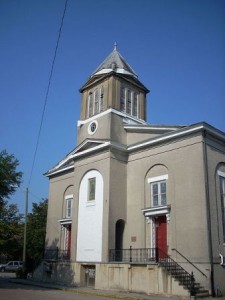
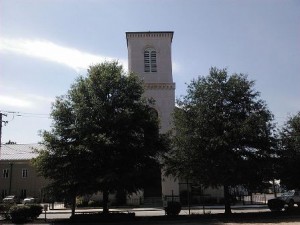
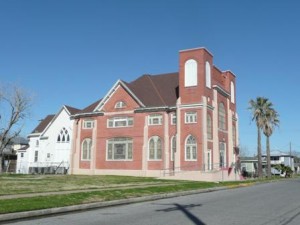
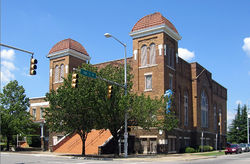
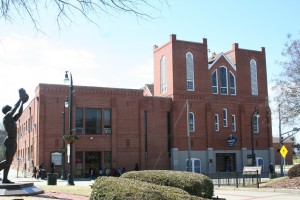
Leave a Reply